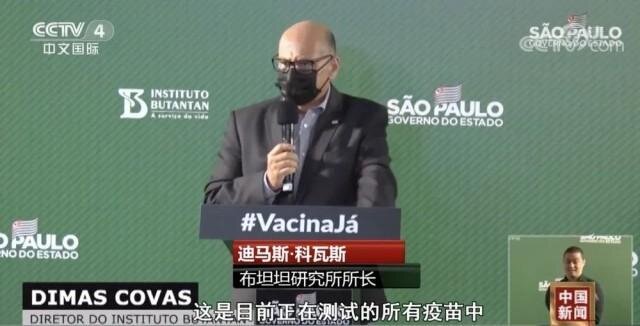The Chinese vaccine has arrived in Brazil, and the test shows the highest safety
In the early morning of the 24th, local time, a batch of 5.5 million doses of Kerlaf Covid-19 vaccine delivered by China had arrived at the Viracopos International Airport in Campinas, Sao Paulo. Next week, the State of São Paulo will receive another 2 million doses of the new crown vaccine.The Director of the Health Department of the State of Sao Paulo, Brazil, Jean Gorrinchtain, stated that he will start vaccinating the people of the state with the new crown on January 25, 2021.
On the 23rd local time, the Sao Paulo state government and the Butantan Institute, an authoritative medical research institution, held a press conference to announce that the third phase of the human trial of the Kerlafor new crown vaccine developed by Beijing Kexing Zhongwei Biotechnology Co., Ltd. has been completed. The test results show that the Chinese new crown vaccine is effective and safe.

Dimas Kovas, director of the Butantin Institute. CCTV video screenshot
Dimas Kovas, director of the Butantin Institute, said that during the trial period, volunteers were injected with more than 20,000 doses of vaccine. Judging from the experimental data that has been obtained, the Kellyford vaccine is currently the safest new crown on the market. vaccine.
Brazil is the first country in the world to complete the third phase of the Kellyford vaccine. The third phase of this vaccine is currently being tested in Indonesia, Turkey and Chile.
Brazil's announcement of China's new crown vaccine data is attracting attention from many parties.
According to a report by Singapore’s “Straits Times” on the 23rd, Indonesian drug regulatory authorities have sought data on Coxing vaccines from Brazil through diplomatic channels, hoping to receive vaccine safety and effectiveness data before December 28, and finally 1 next year Began to implement its vaccination plan in September. According to reports, Kexing Vaccine has also launched a Phase III trial in Indonesia, but because fewer volunteers are recruited and there is a lack of susceptible populations such as medical workers, so far there is no data required to obtain approval for registration. Indonesian officials said that the clinical trials of Kexing vaccine in Brazil were earlier and more stringent than those in Indonesia, and the data can be used as the basis for the evaluation and decision of the Indonesian drug regulatory authority to urgently approve the use of Kexing vaccine. On the 6th, the first batch of 1.2 million doses of Kexing vaccine has been delivered to Jakarta, the capital of Indonesia, and more vaccines are expected to arrive early next year.
The Straits Times reported that Brazil, Indonesia, Singapore and Turkey are expected to use Koxing vaccine in their national vaccination programs.
According to news from Agence France-Presse and The Associated Press, on the 24th local time, Turkish Health Minister Fakhrdin Koca said that the country will receive the first batch of new crown vaccines developed by China Kexing Company in the next few days because the country’s domestic Preliminary test results show that its effectiveness is 91%.
Koca said that the first batch of 3 million doses of Chinese new crown vaccine will depart for Turkey on the evening of the 27th and arrive in the country on the 28th.
According to reports, Turkey has signed an agreement for 50 million doses of Kellyf vaccine.
Turkey plans to vaccinate 9 million people in the first phase. The vaccinations are mainly high-risk groups such as medical staff. Koja said he will also become one of the first vaccinators.
"The Wall Street Journal" once reported that compared with the Pfizer vaccine in the United States, the advantages of the Kellyford vaccine in terms of transportation conditions are very obvious. Pfizer vaccine can only be stored in an environment of minus 70 degrees Celsius, while Kellyford vaccine can be stored at a temperature of 2 to 8 degrees Celsius in a normal refrigerator. This kind of nature that can be stored in ordinary refrigerators has made many underdeveloped regions place their hopes on Chinese vaccines.



